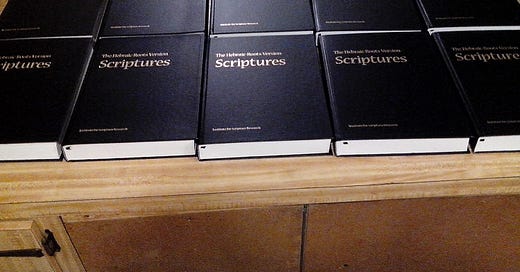I let Perplexity.AI dig up the following info for me. I reviewed it and it seems to be correct.
14 GENERATIONS OF JESUS’ ANCESTRY
James Trimm's Hebraic Roots Version (HRV) of the New Testament does indeed address the issue of the seemingly missing 14th generation in Matthew's genealogy of Jesus. The HRV resolves this apparent discrepancy by presenting a unique interpretation of Matthew 1:16 1,2.
In the HRV, Matthew 1:16 is translated to indicate that Joseph was both Mary's husband and her father. This interpretation suggests that "Joseph" refers to two different individuals in the genealogy:
Joseph, Mary's father
Joseph, Mary's husband
By counting Joseph (Mary's father) as the 13th generation and Jesus as the 14th, the HRV presents a full set of 14 generations in the final group, aligning with Matthew's statement in 1:17 1.
However, it's important to note that this interpretation is not universally accepted among biblical scholars. The HRV's approach to resolving this issue is based on a specific reading of the Aramaic text, which differs from traditional Greek-based translations 2.
While this interpretation offers a solution to the "missing generation" problem, it also raises questions about the genealogical structure and the sudden change in the verse's format compared to the preceding verses 2. As with many aspects of biblical interpretation, this remains a topic of scholarly debate.
HEBRAIC ROOTS VERSION
James Scott Trimm's Hebraic-Roots Version (HRV) of the New Testament is based on several ancient Hebrew and Aramaic sources. His primary sources include:
The Peshitta Aramaic text, which he considers to be the original language of much of the New Testament 1,2.
Hebrew Matthew, specifically the DuTillet Hebrew Matthew manuscript 2.
The Sinaitic Palimpsest, an Old Syriac version of the Gospels 2.
The Evangelion da-Mepharreshe, another Old Syriac text 2.
Various Hebrew and Aramaic manuscripts for other parts of the New Testament 1,2.
For books where reliable Hebrew or Aramaic witnesses were not available (2 Peter, 2 & 3 John, and Jude), Trimm translated from Greek while attempting to reach toward an underlying Aramaic text 2.
Trimm's approach involved consulting previous translations and other resources to create what he considers the most accurate translation possible 2. He aimed for a literal translation that follows the original word order as closely as possible 2.
It's worth noting that Trimm's work is based on his belief that the New Testament was originally written in Hebrew and Aramaic, a view that is not universally accepted among biblical scholars 1,4.
IMPORTANT CHANGES
James Scott Trimm's Hebraic-Roots Version (HRV) of the New Testament made several important additions and changes compared to traditional Greek-based translations:
Use of Aramaic sources: Trimm primarily based his translation on Aramaic texts like the Peshitta, believing that much of the New Testament was originally written in Aramaic 5.
Hebrew Matthew: He incorporated the DuTillet Hebrew Matthew manuscript into his translation 5.
Restoration of Semitic idioms: Trimm attempted to restore Hebrew and Aramaic idioms that may have been lost in Greek translations 6.
Name changes: The HRV uses more Hebraic forms of names, such as "Yahshua" for Jesus and "Shaul" for Paul 7.
Textual corrections: Trimm sought to correct what he believed were mistranslations from Aramaic to Greek, such as the "camel through the eye of a needle" passage 6.
Original order: The HRV presents the Tanakh (Old Testament) in its original Hebrew order, which is unique among Bible translations that include both testaments 2.
Emphasis on Hebrew roots: Throughout the translation, Trimm aimed to highlight the Jewish context and origins of the New Testament writings 8.
HELL NOT ETERNAL
Gary Amirault, founder of Tentmaker Ministries, was a proponent of Christian Universalism who challenged traditional interpretations of hell and eternal punishment. Amirault argued that:
Many words translated as "eternal" or "everlasting" in relation to punishment have been mistranslated.
The concept of eternal hell is not consistent with God's love and the ultimate victory of Christ.
Careful study of original texts reveals that God's judgments are corrective and temporary, not eternal.



